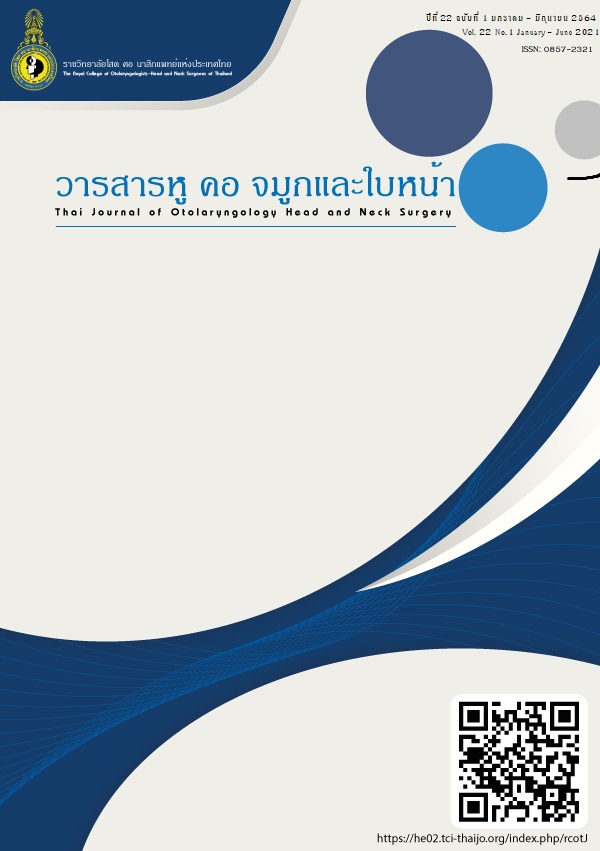A Relationship of Chronic Peripheral Vertigo And Obsessive-Compulsive Disorder A Relationship of Chronic Peripheral Vertigo And Obsessive-Compulsive Disorder
Main Article Content
Abstract
Abstract
Background Vertigo is a hallucination feeling of the body or surroundings spinning. Disorders of
the vestibular system is the most common cause, with an incidence of 80.5 percent. The vestibular
system plays an important role in postural control and regulating the autonomic function.
Therefore, patients with chronic dizziness often demonstrated postural instability and
Previous research found the relationships between vestibular vertigo and psychiatric disorders.
The 3 most common psychiatric disorders are depression (17.4%), followed by anxiety disorder
and obsessive-compulsive disorder. Psychiatric conditions had a negative effect on treatment
outcome as it could induce dizziness as well.
Objectives To study the relationship between chronic vertigo and obsessive–compulsive disorder.
Methods 44 patients with chronic vertigo and 44 healthy volunteers performed the FOCI-T test.
The Chi square was used to analyze the relationship between chronic vertigo and obsessive–
compulsive disorder.
Results Based on the FOCI-T test, 34% of the patients in the chronic vertigo group had high risk of
developing OCD (FOCI-T >5). However, no significant difference was found when compared to
healthy group which has 18% with high risk.
Conclusion Chronic vertigo has no relationship with the obsessive–compulsive disorder.
Keywords: Chronic vertigo, Obsessive-Compulsive disorder
Article Details

This work is licensed under a Creative Commons Attribution-NonCommercial-NoDerivatives 4.0 International License.
ต้นฉบับที่ส่งมาพิจารณายังวารสารหู คอ จมูก และใบหน้า จะต้องไม่อยู่ในการพิจารณาของวารสารอื่น ในขณะเดียวกันต้นฉบับที่จะส่งมาจะผ่านการอ่านโดยผู้ทรงคุณวุฒิ หากมีการวิจารณ์หรือแก้ไขจะส่งกลับไปให้ผู้เขียนตรวจสอบแก้ไขอีกครั้ง ต้นฉบับที่ผ่านการพิจารณาให้ลงตีพิมพ์ถือเป็นสมบัติของวารสารหู คอ จมูกและใบหน้า ไม่อาจนำไปลงตีพิมพ์ที่อื่นโดยไม่ได้รับอนุญาต
ตารางแผนภูมิ รูปภาพ หรือข้อความเกิน 100 คำที่คัดลอกมาจากบทความของผู้อื่น จะต้องมีใบยินยอมจากผู้เขียนหรือผู้ทรงลิขสิทธิ์นั้นๆ และใหร้ะบุกำกับไว้ในเนื้อเรื่องด้วย
References
Bunasuwan P, Bunbanjerdsuk S, Nilsuwan A. Etiology of vertigo in Thai patients at Thammasat Hospital. J Med Assoc Thai. 2011; 94 Suppl 7: S102-S108.
จันทร์ชัย เจรียงประเสริฐ, อาการเวียนศีรษะหมุน (vertigo). ใน: สุภาวดี ประคุณหังสิต, สมยศ คุณจักร, บรรณาธิการ. ตำราโสต ศอ นาสิกวิทยา. พิมพ์ครั้งที่ 1. กรุงเทพฯ : บริษัทโฮลิสติกพับบลิชชิ่ง จำกัด ; 2544:114-37
Von Brevern M, Radtke A, Lezius F,Feldmann M, Ziese T, Lempert T,Neuhauser H. Epidermiology of benign paroxysmal positional vertigo: a population-based study. J Neurosurg Psychiatry 2007; 78: 710-5.
Lopez-Escamez JA, Gamiz MJ, Fernandez- Perez A, Gomez-Finana M. Longterm outcome and health-related quality of life in benign paroxysmal positionalvertigo. Eur Arch Otorhinolaryngol 2 0 0 5 ;262: 507-11.
Clark MR, Sullivan MD, Katon WJ, Russo JE, Fischl M, Dobie RA, Voorhees R. Psychiatric and medical factors associated with disability in patient with dizziness. Psychosomatics 1993; 34: 409-15.
Eckhardt-Henn A, Breuer P, Thomalske C, Hoffmann SO, Hopf HC. Anxiety disorders and other psychiatric subgroups in patient complaining of dizziness. J Anxiety Disord 2003; 17: 338-69.
Hagr A. Comobid psychiatric conditions of benign paroxysmal positional vertigo. Int J Health Sci (Qassim) 2009; 3:23-8.
Ketola S, Havia M, Appelberg B, Kentala E. Depressive symptoms underestimated in vertiginous patients. Otolaryngo HeadNeck
Surg 2007; 137: 312-5.
Eagger S, Luxon LM, Davies RA, Coelho A, Ron MA. Psychiatric morbidity in patients with peripheral vestibular disorder: a
clinical and neuro-otological study. J Neurol Neurosurg, Psychiatry 1992; 55: 383-7
Monzani D, Casolari L, Guidetti G, Rigatelli M. Psychological distress and disability in patients with vertigo. J Psychosom Res
; 50: 319-23.
Yates, B.J., Miller, A.D. Physiological evidence that the vestibular system participates in autonomic and respiratory
control. J. Vestib. Res. 1998; 8: 17-25.
Monzani D, Casolari L, Guidetti G, et al. Psychological distress and disability in patients with vertigo. J Psychoso Res
; 50: 319–23
Clark DB, Hirsch BE, Smith MG, Furman JM, Jacob RG. Panic in otolaryngology patients presenting with dizziness or hearing loss.
Am J Psychiatry 1994; 151:1223-5
Eagger S, Luxon LM, Davies RA, Coelho A, Ron MA. Psychiatric morbidity in patients with peripheral vestibular disorder: a
clinical and neuro-otological study. J Neurol Neurosurg Psychiatry 1992; 55:383-7
Kozak HH, Dündar MA, Uca AU, et al. Anxiety, Mood, and Personality Disorders in Patients with Benign Paroxysmal Positional Vertigo. Noro Psikiyatr Ars. 2018; 55(1): 49-53.
Atmaca, M., et al. Hippocampus and amygdalar volumes in patients with refractory obsessive-compulsive disorder. Prog. Neuropsychopharmacol. Biol. Psychiatry 2008; 32: 1283-6.
Van den Heuvel, O.A., et al. Disorderspecific neuroanatomical correlates of attentional bias in obsessive-compulsive disorder, panic disorder, and hypochondriasis. Arch. Gen. Psychiatry 2005; 62: 922-33.
Dieterich M, Staab JP, Brandt T. Functional (psychogenic) dizziness. Handb Clin Neurol. 2016; 139: 447-68.
Bigelow RT, Semenov YR, du Lac S, et al. Vestibular vertigo and comorbid cognitive and psychiatric impairment: the 2 0 0 8
National Health Interview Survey. Journal of Neurology, Neurosurgery & Psychiatry 2016; 87: 367-72.
Storch EA, Kaufman DA, Bagner D, Merlo LJ, Shapira NA, Geffken GR, et al. Florida Obsessive-Compulsive Inventory:
development, reliability, and validity. J Clin Psychol 2007; 63: 851-9.
Saipanish R, Hiranyatheb T, Jullagate S, Lotrakul M. A study of diagnostic accuracy of the Florida Obsessive-
Compulsive Inventory- Thai Version (FOCI-T). BMC Psychiatry 2015; 15: 251.
Saipanish R, Hiranyatheb T, Lotrakul M. Reliability and validity of the Thai version of the Florida Obsessive- Compulsive Inventory. Scientific World Journal 2015; 2015: 240787.
Prasertchai R, Saipanish R, Hiranyatheb Th, Jullgate S. Obsessive-Compulsive Symptoms in normal Adults. J Psychiatr Assoc Thailand 2017; 62(2): 129-38
Eckhardt-Henn A, Best C, Bense S, Breuer P, Diener G, Tschan R, Dieterich M. Psychiatric comorbidity in different organic vertigo syndromes. J Neurol 2008; 255: 420–8
Katon W, Lin EH, Kroenke K. The association of depression and anxiety with medical symptom burden in patients with chronic medical illness. Gen Hosp Psychiatry 2007; 29:147–5


